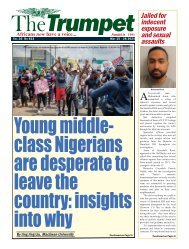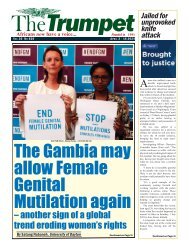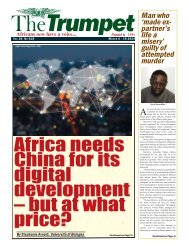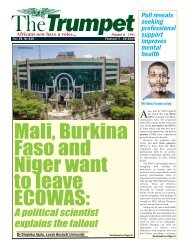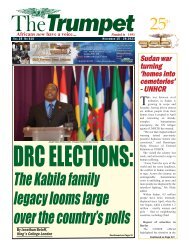The Trumpet Newspaper Issue 524 (July 29 - August 11 2020)
Over 10,000 health workers in Africa infected with COVID-19
Over 10,000 health workers in Africa infected with COVID-19
Create successful ePaper yourself
Turn your PDF publications into a flip-book with our unique Google optimized e-Paper software.
Opinion<br />
JULY <strong>29</strong> - AUGUST <strong>11</strong> <strong>2020</strong><br />
<strong>The</strong><strong>Trumpet</strong><br />
After COVID-19, will Africa catch up,<br />
stand still or fall further behind?<br />
Page9<br />
At one time or another, nations and<br />
individuals confront crisis points<br />
– moments of existential<br />
challenge that also open up new<br />
possibilities. African countries, at just<br />
such a crisis point as a result of the novel<br />
coronavirus, face three possible outcomes<br />
post-pandemic: play catch-up, stand still<br />
or fall even further behind the<br />
industrialized world [1].<br />
With this crisis comes an economic<br />
disruption of unprecedented proportion.<br />
To avoid falling further behind, Africans<br />
must narrow the scientific and technology<br />
gap and leverage our comparative<br />
advantages. It is time for Africa to adopt<br />
radical technological and policy<br />
innovations. <strong>The</strong> global economy is<br />
increasingly driven by science-based and<br />
patent-intensive systems. Through<br />
investments in molecular technology, AI<br />
and other technologies the 4 th industrial<br />
Revolution is ushering in, they can<br />
overcome existing barriers to entry.<br />
Catching up<br />
India offers an example of how to<br />
catch up. <strong>The</strong>re, two key developments in<br />
the sixties and seventies sharply altered<br />
the country’s trajectory.<br />
In 1965, following past famines crises,<br />
India imported 250 tons of high-yielding<br />
Mexican dwarf wheat seed varieties for<br />
wide-scale testing on farms. Early positive<br />
results led to the importation of a further<br />
18,000 tons. Along with the use of<br />
irrigation and other innovations adopted<br />
by farmers, Indian agriculture was<br />
transformed.<br />
Within five years, India produced<br />
enough grains to support its population<br />
and, even following a drought in 1979,<br />
had no need to import grain. Overall, the<br />
country’s wheat and rice production<br />
tripled between 1961 and 1980. Radical<br />
policy response to famine-induced crisis<br />
birthed the Green Revolution.<br />
India’s pharmaceutical sector also<br />
experienced a crisis-inflection point in<br />
1972, when the government passed the<br />
Patents Act, which enabled domestic firms<br />
to replicate drugs that had been patented<br />
by multinational corporations. Local<br />
companies have since dominated the<br />
global market through reverseengineering<br />
leading to generic medicines<br />
that are far more affordable than patented<br />
ones. Radical policy response to crisisinduced<br />
shortage of medicines<br />
transformed Indian Pharma.<br />
Falling behind<br />
Africa processes a very small<br />
proportion of its agricultural produce. We<br />
continue to export raw commodities like<br />
cocoa, timber and cotton that others<br />
process and re-sell to Africa at a much<br />
higher valuation. Our continent also has<br />
sufficient sunlight, wind and hydropower,<br />
technologies that can power<br />
Africa sustainably, and other regions<br />
besides.<br />
Critically, Africa also has a median age<br />
of 19, far younger than that of any<br />
continent, a potential demographic<br />
dividend of young innovation-driven<br />
workers and a relatively small proportion<br />
of elderly workers. This human capital<br />
will foster Africa’s forging ahead.<br />
If we fail to harness new technologies<br />
and leverage our strengths to create<br />
abundant high paying manufacturing and<br />
service jobs to compete within global<br />
supply chains, then we risk falling even<br />
farther behind on socioeconomic terms.<br />
Forging ahead<br />
To forge ahead, Africa will first have<br />
to return swiftly to economic growth.<br />
Beyond that, diversifying our economies<br />
will be critical, particularly for those<br />
countries that are dependent on one or two<br />
mineral resources or commodities. Above<br />
all, African companies must deepen<br />
capacities for competitive advantage to<br />
master new technologies in emerging<br />
sectors.<br />
African innovators need a robust<br />
innovation framework and a better<br />
enabling environment to master the socalled<br />
industrial biology embedded in the<br />
4 th Industrial Revolution. For instance,<br />
firms in Morocco, Senegal, Nigeria and<br />
some other African countries have<br />
developed COVID-19 test kits but face a<br />
difficult path to commercialization.<br />
China’s response to the COVID-19<br />
pandemic is once more illustrative of a<br />
dynamic industrial policy. It is targeting<br />
ambitious increases in domestic firms’<br />
share of the global medical supplies<br />
market. <strong>The</strong> government has provided<br />
cheap land for factories subsidized loans,<br />
helps them to secure a supply chain of raw<br />
materials, and to stimulate domestic<br />
demand by incentivizing hospitals and<br />
companies to use their products.<br />
And there are powerful examples right<br />
here on the continent. South Africa<br />
successfully financed the production of<br />
<strong>The</strong> National Ventilator Project to address<br />
COVID-19, developing prototypes,<br />
securing component supply chains, and a<br />
manufacturing facility. <strong>The</strong> project owes<br />
its success in part to strong government<br />
support and broad coordination among<br />
economic and technological agencies. As<br />
with South Africa, the rest of the continent<br />
would benefit from strong innovation<br />
systems that are part of national budgeting<br />
and planning frameworks.<br />
African businesses have a critical role<br />
to play, but so do African leaders, who<br />
must strike a delicate balance between<br />
State intervention and open markets.<br />
African governments are best placed to<br />
identify market failures and opportunities,<br />
and devise policies and regulations that<br />
By Professor Banji<br />
Oyelaran-Oyeyinka<br />
benefit Africa’s private sector and its<br />
people.<br />
* Professor Banji Oyelaran-Oyeyinka,<br />
is the Senior Special Adviser on<br />
Industrialization to the President, AfDB,<br />
he is a Fellow of the Nigerian Academy of<br />
Engineering and Professorial Fellow,<br />
United Nations University.<br />
[1] <strong>The</strong> theory was mooted in a 1986<br />
paper by Moses Abramovitz who posited<br />
that countries with lagging productivity<br />
could grow rapidly and catch up with the<br />
leading economies by realizing their<br />
potential.<br />
NDDC and other stories<br />
Continued from Page 8<<br />
he delegates authority to them and they are<br />
required to help him achieve the objectives<br />
of his administration. Under President<br />
Buhari, the in-fighting among his team<br />
conveys the impression that many of his<br />
appointees are either not interested in his<br />
own objectives or they are on a frolic of<br />
their own. We have had the Director<br />
General of the Nigerians in Diaspora<br />
Commission at logger heads with the<br />
Minister of Communications over office<br />
space; Minister of Information vs. DG<br />
National Broadcasting Commission<br />
(NBC), Minister of Labour and<br />
Employment vs. MD NSITF, Joy Nunieh<br />
vs Godswill Akpabio; Minister of Health<br />
vs. Executive Secretary, NHIS, AGF<br />
Malami vs EFCC Chair Magu, DSS vs.<br />
EFCC, First Lady vs. Presidential<br />
aides…all fighting-to-finish as if “Oga is<br />
not around”. <strong>The</strong>y have done so much<br />
damage. Five years ago, the fear of<br />
Buhari’s war against corruption was the<br />
beginning of wisdom Today, his own<br />
appointees and political associates have<br />
messed up the message and strategy. <strong>The</strong><br />
economy is in bad shape. <strong>The</strong> war against<br />
terror is not working…<br />
Whatever is happening is a wake-up<br />
call and an opportunity for Mr. President<br />
to steady the ship. He needs to rescue his<br />
government from ambitious and disloyal<br />
individuals and strengthen the institutions<br />
of State. He should disband the present<br />
Interim Management Committee of the<br />
NDDC and sack the Minister of Niger<br />
Delta Affairs. <strong>The</strong> Board of the NDDC as<br />
provided for in the enabling Act should be<br />
immediately constituted. <strong>The</strong> audit of the<br />
Commission must be totally independent<br />
without any interference. <strong>The</strong> major<br />
challenge at the NDDC is that politics has<br />
been placed above development<br />
objectives. That must change with<br />
appropriate mechanisms put in place. On<br />
the war against corruption, the<br />
Independent Corrupt Practices and Other<br />
Offences Commission (ICPC) should also<br />
be audited. <strong>The</strong>reafter, it should be merged<br />
with the EFCC. <strong>The</strong> new EFCC should<br />
then be unbundled. It should have<br />
autonomous departments: an investigation<br />
department, a prosecution department and<br />
an enforcement department, all headed<br />
separately by professionals who will not<br />
be required to report to one individual. <strong>The</strong><br />
EFCC must also be disengaged from the<br />
Nigerian Police. Since inception, only<br />
policemen have led the EFCC. How about<br />
neutral persons or graduates of the EFCC<br />
Academy that has produced many officers<br />
who have enjoyed international training<br />
and who joined the EFCC with the hope<br />
that they were looking forward to a career?<br />
<strong>The</strong> President must restore dignity and<br />
respect to the governance process.



